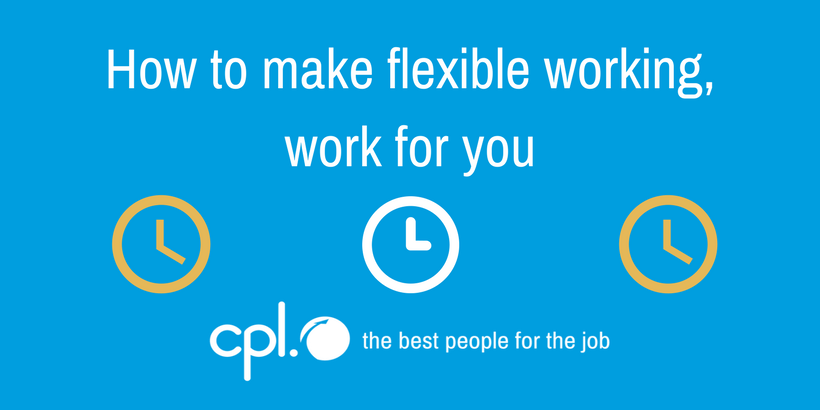Flexible working covers anything from working outside the typical 9-5 hours to remote working or working from home for a portion, or all, of the week.
According to our recent Employment Monitor Survey, over 35% of people are now working flexible hours in Ireland. The world of work is rapidly changing, so it comes as no surprise that we’re no longer all desk bound from Monday to Friday. Once you have Wi-Fi and a laptop, you can set up shop pretty much anywhere and at any time.
While flexible work certainly has its benefits, flexible working isn’t all home comforts and escaping your commute. To make your flexible work life as easy as possible employ these simple tips, and ensure that it works for both you and your employer.
Flexible Working Tips
1. Be results driven
As you will be judged against your contribution, not the clock, you need to be sure of what your goals are each day and how you are going to achieve them within your flexible schedule.
This doesn’t mean you can’t still take coffee breaks or the odd browse online but productivity is now the metric, not sitting at your desk. Make sure you know what’s expected of you and establish clear reporting to show you’re delivering results no matter where you are.
2. Keep a routine
If you are going to work from home, try and keep a routine to stay motivated. Whether this involves getting dressed for the day (no suit required) or sitting at a desk, do something to make your day ‘work-like’. After all, it’s still a work day so treat it with a certain amount of formality.
3. Don’t work from bed
On that point, as tempting as it may be to stay tucked up in bed, it’s best to avoid. Failing to separate work and technology is bad for both your work and your sleep.
Instead, find a quiet space where you won’t get distracted, whether that’s a study at home or local café. If either of these don’t give you the peace you need, try a remote working space like We Work.
4. Keep yourself in the loop
While you may not be physically present, your manager & colleagues still need to feel like they can contact you. The last thing you want is for your flexible working to impact your collaboration with colleagues.
Schedule regular calls or video chats so that you don’t rely on email where misunderstandings can happen. Also, appear online via your group email/chat service so your colleagues know available for quick contact.
5. Have everything you need
Make sure you have access to security and any programs you may need e.g. photoshop, excel etc. Without these, you won’t be able to do your job. If you don’t have something you need sort it out as quick as possible. By ironing out any technical difficulties early on you’ll show initiative and prove that you can be as productive at home as you were at your desk.
6. Don’t become inflexible
Sometimes you will be required to be in the office or attend meetings offsite. Don’t get into the habit of only working at home and becoming isolated from the outside world – this defeats the purpose of working flexibly in the first place!
Don’t become reclusive, meet friends on your coffee break or spend time with your children at lunch to keep up the social life you lose out on at the office.
Your freedom to work flexibly will ultimately depend on the attitude of your manager but by employing the above you can do your bit to show that you can make flexibility effective for you and for your employer.
